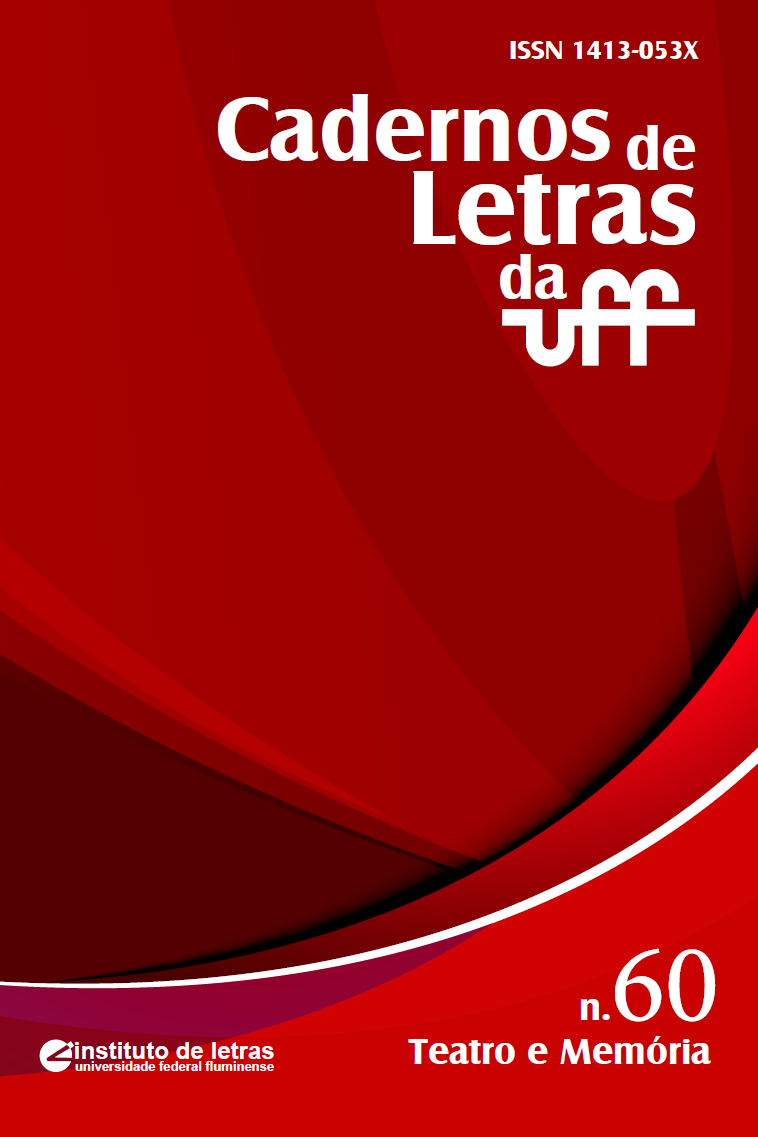Fantasmas de um vivo futuro: memória e história em depois dos últimos dias, de Christoph Marthaler
DOI:
https://doi.org/10.22409/cadletrasuff.2020n60a752Keywords:
teatro contemporâneo, estética e política, teatro alemãoAbstract
Analisando o espetáculo teatral Depois dos últimos dias, criado pelo encenador suíço Christoph Marthaler para a Trienal de Ruhr em 2019, almejamos apresentar uma possível abordagem do tempo cênico para além do presente dramático, da história como narrativa épica ou da memória individual: um tempo assombrado por fantasmas vindos do passado, mas também, talvez surpreendentemente, do presente e do futuro.
Downloads
References
_________________. Teoria Estética. Lisboa: Edições 70, 1993.
AGAMBEN, Giorgio. O que resta de Auschwitz: o arquivo e o testemunho [Homo Sacer III]. São Paulo: Boitempo, 2008.
BARNETT, David. Christoph Marthaler: The Musicality, Theatricality and Politics of Postdramatic Direction. In: DELGADO, Maria M. e REBELLATO, Dan (eds.). Contemporary European Theatre Directors. Abingdon: Routledge, 2010, p. 185-203.
BROWN, Wendy. ‘Specters and Angels: Benjamin and Derrida”. In: Politics out of history. Princeton: Princeton University Press, 2001, 138-174.
CARLSON, Marvin. Theatre Is More Beautiful Than War: German Stage Directing in the Late Twentieth Century. Iowa City: University of Iowa Press, 2009
CARP, Stefanie. Nach den letzten Tagen: ein Spätabend (programa da peça). Bochum: Kultur Ruhr, 2019.
_____________. Berlin – Zürich – Hamburg: Texte zu Theater und Gesellschaft. Berlim: Theater der Zeit, 2007.
DERRIDA, Jacques. Espectros de Marx: o Estado da dívida, o trabalho e a Nova Internacional. Rio de Janeiro: Relume-Dumará, 1994.
DIDI-HUBERMAN, Georges. Sobrevivência dos vagalumes. Belo Horizonte: Editora UFMG, 2011.
FALENTIN, Andreas. Doppelte Erinnerung. Die deutsche Bühne, https://www.die-deutsche-buehne.de/kritiken/doppelte-erinnerung, 10 de setembro de 2019.
GASPAR, Gabriela. Música conduz King Size. MITsp, março de 2018, https://mitsp.org/2018/musica-conduz-king-size/, 10 de setembro de 2019.
GEISELBERGER, Heinrich (org.). A grande regressão: um debate internacional sobre os novos populismos — e como enfrentá-los. São Paulo: Estação Liberdade, 2019.
GUIMARÃES, Júlia. O avesso da familiaridade. MITsp, março de 2018, https://mitsp.org/2018/o-avesso-da-familiaridade/, 10 de setembro de 2019.
JI, Renan. Bombons para plateias imaginárias. MITsp, março de 2018, https://mitsp.org/2018/bombons-para-plateias-imaginarias/, 10 de setembro de 2019.
JOHNSON, Boris. Africa is a mess but we can’t blame colonialism. The Spectator, julho de 2016, https://blogs.spectator.co.uk/2016/07/boris-archive-africa-mess-cant-blame-colonialism/, 25 de setembro de 2019.
JUNGBLUT, Peter. Alle Menschen werden müder. Klassik.de, https://www.br-klassik.de/aktuell/news-kritik/ruhrtriennale-2019-christoph-marthaler-nach-den-letzten-tagen-kritk-100.html, 20 de setembro de 2019.
LEHMANN, Hans-Thies. Teatro pós-dramático. São Paulo: Cosac & Naify, 2007.
MENKE, Christoph. The sovereignty of art: aesthetic negativity in Adorno and Derrida. Cambridge: The MIT Press, 1998.
MUSCIONICO, Daniele. Murx den Ãœbereuropäer: Christoph Marthaler radikalisiert sich. Neue Zürcher Zeitung, https://www.nzz.ch/feuilleton/marthaler-zeigt-an-der-ruhrtriennale-sein-radikalstes-werk-ld.1503577, 20 de setembro de 2019.
NUNES, Leandro. MITsp: “King Size’ recusa o silêncio da plateia e evoca um musical sobre solidão. Estadão, março de 2018, https://cultura.estadao.com.br/blogs/cafe-teatro/mitsp-king-size-recusa-o-silencio-da-plateia-e-evoca-um-musical-sobre-solidao/, 10 de setembro de 2019.
PRIMAVESI, Patrick. A Theatre of Multiple Voices. Performance Research, 8:1, 61-73, 2003, DOI: 10.1080/13528165.2003.10871910.
SAFATLE, Vladimir. Cinismo e falência da crítica. São Paulo: Boitempo, 2008.
SCHULZ, Susanne. Die Figur im Theater Christoph Marthalers. St Augustin: Gardez! Verlag, 2002.
SEEL, Martin. Standstills in motion: Cinema and elsewhere. In: GÖRLING, Reinhold, GRONAU, Barbara e SCHWARTE, Ludger (eds.). Aesthetics of Standstill. Berlim: Sternberg Press, 2019, 270-283.
___________. Estética del aparecer. Madri: Katz, 2010.
SIEGMUND, Gerald. Theater als Gedächtnis: semiotische und psychoanalytische Untersuchung zur Funktion des Dramas. Tübingen: Narr, 1996.
SMITH, Steve. Radical rage against the machine: Four compositions by Luigi Nono at Frederick Loewe Theater. The New York Times, 19 de fevereiro de 2012, https://www.nytimes.com/2012/02/29/arts/music/four-compositions-by-luigi-nono-at-frederick-loewe-theater.html, 15 de outubro de 2019.
SZONDI, Peter. Teoria do drama moderno (1880-1950). São Paulo: Cosac & Naify, 2001.
TILL, Nicholas. On the Difficulty of Saying “We’: The unheimliche Heimat in the Music Theatre of Christoph Marthaler. Contemporary Theatre Review, 15:2, 219-233, Londres, 2005.
ZUPANČIČ, Alenka. The Apocalypse is (still) disappointing. S: Journal of the Circle for Lacanian Ideology Critique, 10 & 11, 16-30, 2017/18.
Downloads
Published
How to Cite
Issue
Section
License
I authorize Cadernos de Letras da UFF to publish the paper of my authorship/responsibility that I now submit, in case it is accepted for online publication.
Moreover, I declare that this contribution is original, that it was not submitted to any other editor for publication, and I sign the present declaration attesting the truth of all its contents.
The copyright of the works published at the virtual space of the Cadernos de Letras da UFF are automatically entitled to Cadernos de Letras da UFF. Their total or partial reproduction is conditioned to the authors' citations and publication data.

Cadernos de Letras da UFF is licensed under a Creative Commons - Attribution-NonCommercial 4.0 International (CC BY-NC 4.0).





